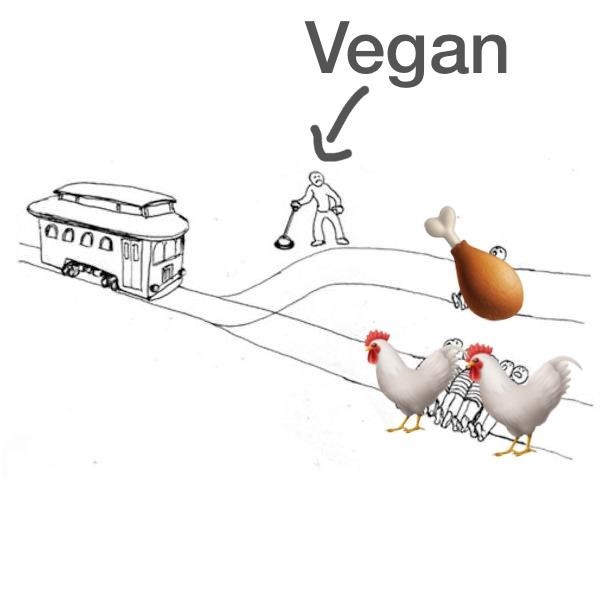Thank you, Elle Flinn-Shephard, for such a dilemma!
This question touches many important ethical issues. It looks a lot like the famous trolley problem: Imagine that you are the driver of a runaway train. Up ahead you see 5 people tied to the track. If you do nothing, the train will kill them all. But there is a side track, where sits a clueless railway worker, eating a sandwich (perhaps with chicken) for lunch. Should you change the tracks, killing the worker but saving the lives of five people?
There are two main answers. One is utilitarian, the idea being that moral actions should increase global happiness; in other words, the results are all that matter. In this case, the answer is simple: you should change tracks because it would result in only one death, whereas doing nothing would result in five. Most people interested in the trolley problem claim that this is the only reasonable choice (check out Trolley Problem Memes).
The other answer is deontological, the idea being that you should always follow a law that you want to be universal; in other words, the rules are all that matter. In this case, changing tracks would be tantamount to murder: the innocent worker’s death would be totally on you. And we can all agree that there is and should be the universal law ‘thou shall not kill’. If it sounds unconvincing, imagine that instead of a runaway train there is a transplant surgeon who can kill a random person and use their organs to save the lives of five patients.
Back to the question at hand: we could imagine a situation with one chicken on the side track and two chickens on the main track. But this is not the whole story, because presumably the vegan did not kill the chicken; all they have to do is eat it. So, the chicken on the side track is already dead. I suppose that under these circumstances, some vegans would just eat the dead chicken. But, for many vegans, eating meat has serious moral implications; they may still refuse – why?
From a utilitarian perspective, this would be unacceptable. From a deontological perspective, one could argue that they are not the ones killing the chickens, and ‘not eating chickens’ should be a universal law (for vegans, at least). But I think that we can agree that in the real life one is neither purely deontologist nor purely utilitarian. Then again, I think that there are some actions which people would agree are immoral, even if there is no victim. Eating meat from naturally deceased endangered species, for example, or incest between two consenting and independent adults with the use of contraceptives (so there is no victim like an inbred child), or not keeping deathbed promises (if the person is dead, then you will harm no one by not fulfilling the promise). In all these cases, even though there is no victim, many people would feel a moral uneasiness towards these actions. I suppose that eating the meat of already dead animals is similar for some vegans – after all, the meat is for them an already a disgusting, spoiling piece cut from a sentient being.
I think that non-vegans may reach an answer if they reformulate the question in more familiar terms. Since there are chickens on both sides of the dilemma, I would like to ask you: Would you eat a human if you were told that two people would get killed if you did not? Or, even better: Would you eat an animal from a species you care for (a dog in the West, say, or a cow in India, or a kitten on the Internet) if you were told that two other ones would get killed if you did not?
[WARNING: BLACK MIRROR SEASON 1 SPOILERS AHEAD…]
Of course, it is also a possibility that the vegan has been lied to; that even if they refuse to eat chicken, two chickens will not in fact be killed. But I presume that, here, the death of the two innocent chickens is guaranteed. This variant of the dilemma was perfectly captured in the first episode of Black Mirror series
What do you think? Should a vegan eat one chicken to save two? Let us know in the comments, especially if you are a vegan!
And, as always, if you have a question for the Armchair Philosophers, don’t hesitate to get in touch. You could send us a message or fill in this form.
I have studied philosophy since 2010 at Adam Mickiewicz University in Poznań (I do not like moving). Currently, I am trying really hard to finish my Ph.D. thesis concerning the concept of the technical object in contemporary continental philosophy. I mostly work in the field of philosophy of technology, poststructuralism, critical theory, and posthumanism. Personally, I am a big fan of relational ontologies. I believe that the "essence" of things is only a consequence of their relations to other entities. I haven't published much in English, but check my Academia profile or contact me if you are interested in my research.

